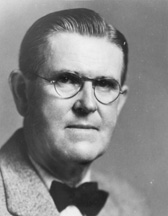A. Victor Donahey
| A. Victor Donahey | |
|---|---|
 |
|
| 50th Governor of Ohio | |
|
In office January 8, 1923 – January 14, 1929 |
|
| Lieutenant |
Earl D. Bloom Charles H. Lewis Earl D. Bloom William G. Pickrel George C. Braden |
| Preceded by | Harry L. Davis |
| Succeeded by | Myers Y. Cooper |
|
United States Senator from Ohio |
|
|
In office January 3, 1935 – January 3, 1941 |
|
| Preceded by | Simeon D. Fess |
| Succeeded by | Harold H. Burton |
| Ohio State Auditor | |
|
In office 1913–1921 |
|
| Preceded by | Edward M. Fullington |
| Succeeded by | Joseph T. Tracy |
| Personal details | |
| Born |
Alvin Victor Donahey July 7, 1873 Cadwallader, Tuscarawas County, Ohio |
| Died | April 8, 1946 (aged 72) Columbus, Ohio |
| Political party | Democratic |
Alvin Victor Donahey (also known as A. Victor Donahey, A. Vic Donahey, Vic Donahey, A. V. Donahey, or Honest Vic Donahey) (July 7, 1873 – April 8, 1946) was a Democratic Party politician from Ohio. Donahey was the 50th Governor of Ohio and a United States Senator from Ohio.
Donahey was born in Cadwallader, Tuscarawas County, Ohio. His parents were John C. Donahey and Catherine (Chaney) Donahey. He graduated from the Cleveland Institute of Art. Donahey married Mary Edith Harvey on January 5, 1897. They had twelve children; ten lived to adulthood.
Donahey served as Tuscarawas County Auditor from 1905 to 1909 while at the same time serving on New Philadelphia, Ohio's Board of Education. After serving as a delegate to the 1912 Constitutional Convention, Donahey served as State Auditor from 1912 to 1921. He did not seek re-election in 1920, running instead for Governor.
Donahey lost that election but won the position two years later, serving three terms from 1923 to 1929. He did not run for re-election in 1928. Donahey earned the nickname "Veto Vic" while Governor because he vetoed seventy-six bills during his first term in office.
From 1926 to 1928 Donahey was mentioned as a possible candidate for President or Vice President in the 1928 election. He received five delegate votes for the presidential nomination which went to Alfred E. Smith, but was not a candidate for the Vice Presidential nomination, which went to Joseph T. Robinson.
He won election to the United States Senate in 1934, unseating Republican Simeon Fess by a wide margin (1,276,208 to 839,068) and served one term in the Senate from 1935 until 1941, before retiring. In 1940 Democrats in Ohio asked him to consider running for President as a favorite son in an effort to aid Franklin D. Roosevelt's bid for a third term, but he declined. (The plan would have had Ohio's delegates to the Democratic National Convention pledged to Donahey until Roosevelt became a candidate, at which point Donahey would release the delegates to Roosevelt.)
...
Wikipedia
